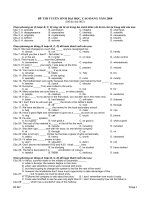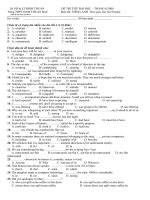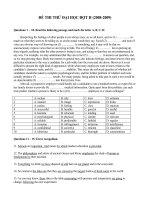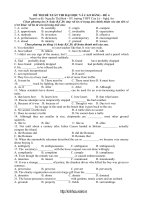- Trang chủ >>
- Đề thi >>
- THPT Quốc Gia
Đề thi thử đại học môn Tiếng Anh (70)
Bạn đang xem bản rút gọn của tài liệu. Xem và tải ngay bản đầy đủ của tài liệu tại đây (187.04 KB, 7 trang )
Trang 1/7
MOON.VN
– CÔ VŨ MAI PHƯƠNG -
ĐỀ THI THỬ KỲ THI THPTQG NĂM 2015
MÔN: TIẾNG ANH LỚP: 12
Thời gian làm bài: 90 phút, không kể thời gian phát đề
Đề thi có 6 trang, gồm 64 câu trắc nghiệm và phần tự luận
Mã đề thi: 175
Mark the letter A, B, C, or D on your answer sheet to indicate the word that differs from the rest in the
position of the main stress in each of the following questions.
Question 1. A. message B. device C. recent D. cherish
Question 2. A. agriculture B. architecture C. literature D. manufacture
Question 3. A. photography B. managerial C. discourteous D. incredible
Question 4. A. markedly B. allegedly C. needed D. walked
Question 5. A. miles B. words C. accidents D. names
Mark the letter A, B, C or D on your answer sheet to indicate the underline part that needs correcting.
Question 6: Pollution makes streams, lakes and (A) coastal water (B) unpleasant to look at, to smell, and
to swim in. Fish and shellfish (C) harvested from polluted waters may be unsafe (D) to eat.
Question 7: A (A) finishing (B) motion picture is (C) the work of the collaboration of many (D)
individuals.
Question 8: Educational films are (A) made for schools, training films for industry; documentary films
(B) present (C) fact events or circumstances of social, political, or (D) historical nature.
Question 9: The train to Ho Chi Minh city left at (A) precisely 7 o’clock (B) as usually, but the train to
Ha Noi capital left at half past six o’clock , (C) which was (D) exactly 20 minutes late.
Question 10: (A) Whether life in the countryside is better than (B) that in the city (C) depend on each
individual’s (D) point of view.
6. A 7. A 8 C 9B. 10 C
Mark the letter A, B, C, or D on your answer sheet to indicate the correct answer to each of the following
questions.
Question 11: Many an environmentalist, in addition to many economists, _____ that if oil supplies _____
in the near future, we would find it hard to fulfil our energy needs.
A. believe / were running out B. believed / had run out
C. believes / were to run out D. believing / would run out
C
Question 12: - “What do you think of football?” - "________"
A. I am crazy about it. B. Well, it's beyond my expectation
C. It's none of my business. D. Of course, football players are excellent
A
Question 13: ______there should be more control over handguns has long been a topic of debate in the
United States.
A. Whether B. If C. That D. Considering
A
Question 14: The professor, along with his students, _____ the meeting held in Toronto next week.
A. attends B. attend C. is attending D. are attending
Trang 2/7
C
Question 15 _____ ten people came forward of their own accord. Despite this, we decided not to recruit
more participants.
A. As many as B. Even more than C. Not many as D. As few as
D
Question 16: The thieves may have made their _____ in a white Mercedes van.
A. get-together B. get-out C. get-up D. getaway
D
Question 17: One of their two sons is studying to be a doctor; but_____ wants to be a musician.
A. other B. another C. the other D. others
C
Question 18: The UN demanded _____ from Vietnamese Eastern waters.
A. that all Chinese troops be of withdrawing B. all Chinese troops to withdraw
C. that all Chinese troops withdraw D. all Chinese troops that they withdraw
C
Question 19: Jason was wearing _____ at the party.
A. a yellow, wide, silk, ridiculous tie B. very ridiculous wide, yellow, silk tie
C. the most ridiculous wide, yellow, silk tie D. a ridiculous silk, wide, yellow tie
C
Question 20: Jim: “You really have a good game today, Jack!” Jack: “ ________”.
A. You must be kidding. It’s terrible.
B. Say it again. I like to hear your words.
C. I think so. I am proud of myself.
D. Thank you too much for saying so. That is a nice compliment.
A
Question 21: I’m afraid I can’t help you. I am completely _____ astrophysics.
A. disinterested in B. unfamiliar to C. unaware of D. ignorant about
D
Question 22: When I borrowed his book, he was angry as if _____ the most precious thing in this world.
A. robbed of B. he had been robbed from
C. having been stolen D. to have been stolen of
A
Question 23: The reason for her late arrival at the meeting was _____ a traffic jam.
A. owing to B. due to C. a result of D. as to
B
Question 24: The little boy did nothing but _____ during the party.
A. crying B. cry C. to cry D. for crying
B
Question 25: One of the areas of multimedia that is growing quickly______is sound.
A. yet is easily overlooked B. it is easily overlooked
C. is easily overlooked D. that is easily overlooked
Trang 3/7
A
Question 26: Passengers are kindly requested to______smoking in the gangways.
A. refrain from B. put out their C. give up D. keep out of
A
Question 27: Nobody has told Jack about his sack yet, ________ ?
A. hasn’t he B. have they C. haven’t they D. has he
B
Question 28: When taking the exam, make sure you _____ the same amount of time to each question.
A. allocate B. appoint C. disperse D. distribute
A
Question 29: Her career really _____ after she was spotted by a talent scout.
A. came about B. fell through C. stretched out D. took off
D
Question 30: Mark the letter A, B, C, or D on your answer sheet to indicate the word or phrase that is
CLOSEST in meaning to the underlined part in each of the following questions.
Two small toy manufacturers consolidated to form a new business.
A. divided B. advertised C. united D. assembled
C
Question 31: That the government ought to develop a job program seemed to Congress an indisputable
fact.
A. indispensible B. irresponsible C. undeniable D. indefinite
C
Question 32: Do we have enough people on hand to help us move our stuff into the house?
A. nearby
B. indisposed
C. available
D. confident
C
Mark the letter A, B, C, or D on your answer sheet to indicate the word or phrase that is OPPOSITE in
meaning to the underlined part in each of the following questions.
Question 33: Lakes occupy less than two percent of the Earth’s surface, yet they help sustain life.
A. prolong B. obstruct C. support D. destroy
B
Question 34: He had never experienced such discourtesy towards the president as it occurred at the
annual meeting in May.
A. politeness B. rudeness C. measurement D. encouragement
A
Read the following passage and mark the letter A, B, C or D on your answer sheet to indicate the best
option for each of the blanks.
Trang 4/7
People’s fingernails and toenails, according to a recent study, are nowadays growing more
quickly. Research (35) _____ out at the University of North Carolina indicates that the speed at which
human nails are growing has increased by (36) _____ 25 per cent over the last 70 years. The results of the
study show that the (37)_____ human fingernail now grows about 3.5 mm a month, (38) _____ just 3 mm
seven decades ago. Toenail growth, (39) _____ only about 2 mm per month, was also up on the figure
(40) _____ in a similar survey done 70 years ago.
Researchers (41) _____ the rapid increase down to changes in lifestyle, particularly the greater
awareness of the importance of regular exercise and a healthy diet. This, they point out, is in (42)
_____with similar trends in the height and weight of present-day adults. Interestingly, it appears that nails
have a propensity to grow fastest (43) _____ warmer conditions, with the quickest growth rate among
young people, and men. The fastest-growing nail is on the middle finger while that on the little finger is
(44) _____ the slowest, at only a fraction over 3 mm each month.
Question 35. A. carried B. studied C. taken D. worked
Question 36. A. few B. some C. little D. near to
Question 37. A. average B. common C. medium D. standard
Question 38. A. comparative with B. on comparing to C. comparable to D. by comparison with
Question 39. A. although B. despite C. however D. nevertheless
Question 40. A. achieved B. arrived C. concluded D. obtained
Question 41. A. set B. say C. put D. write
Question 42. A. alignment B. harmony C. line D. compliance
Question 43. A. in B. at C. on D. under
Question 44. A. by far B. in so far as C. far and wide D. far from
35 - 44 : ABADADCCAA
Read the following passage and mark the letter A, B, C, or D on your answer sheet to indicate the
correct answer to each of the questions.
We are descendents of the ice age. Periods of glaciation have spanned the whole of human
existence for the past 2 million years. The rapid melting of the continental glaciers at the end of the last
ice age spurred one of the most dramatic climate changes in the history of the planet. During this
interglacial time, people were caught up in a cataclysm of human accomplishment, including the
development of agriculture and animal husbandry. Over the past few thousand years, the Earth’s climate
has been extraordinarily beneficial, and humans have prospered exceedingly well under a benign
atmosphere.
Ice ages have dramatically affected life on Earth almost from the very beginning. It is even
possible that life itself significantly changed the climate. All living organisms pull carbon dioxide out of
the atmosphere and eventually store it in sedimentary rocks within the Earth’s crust. If too much carbon
dioxide is lost, too much heat escapes out into the atmosphere. This can cause the Earth to cool enough
for glacial ice to spread across the land.
In general the reduction of the level of carbon dioxide in the atmosphere has been equalized by the
input of carbon dioxide from such events as volcanic eruptions. Man, however, is upsetting the equation
by burning fossil fuels and destroying tropical rain forests, both of which release stored carbon dioxide.
This energizes the greenhouse effect and causes the Earth to warm. If the warming is significant enough,
the polar ice caps eventually melt.
The polar ice caps drive the atmospheric and oceanic circulation systems. Should the ice caps
melt, warm tropical waters could circle the globe and make this a very warm, inhospitable planet.
Over the past century, the global sea level has apparently risen upwards of 6 inches, mainly
because of the melting of glacial ice. If present warming trends continue, the seas could rise as much as 6
feet by the next century. This could flood coastal cities and fertile river deltas, where half the human
population lives. Delicate wetlands, where many marine species breed, also would be reclaimed by the
sea. In addition, more frequent and severe storms would batter coastal areas, adding to the disaster of the
higher seas.
The continued melting of the great ice sheets in polar regions could cause massive amounts of ice
to crash into the ocean. This would further raise the sea level and release more ice, which could more than
double the area of sea ice and increase correspondingly the amount of sunlight reflected back into space.
Trang 5/7
The cycle would then be complete as this could cause global temperatures to drop enough to initiate
another ice age.
Question 45. According to the passage, carbon dioxide is stored in each of the following EXCEPT
A. polar ice caps B. sedimentary rocks C. rain forests D. fossil fuel
Question 46. What does the final paragraph of the passage mainly discuss?
A. The relationship between the ocean and the sun
B. The amount of sunlight reflected into space
C. A rise in global temperatures
D. The conditions that could lead to an ice age
Question 47. The word beneficial in the first paragraph is closest in meaning to
A. calm B. inviting C. thoughtful D. favorable
Question 48. Which of the following does the author NOT mention as a consequence of a large rise in
global sea level?
A. The destruction of wetlands B. The flooding of cities
C. A more diverse marine population D. Severe storms
Question 49. According to the passage, what is the relationship between carbon dioxide and the Earth’s
climate?
A. Carbon dioxide, which is trapped in glacial ice, is released when warm temperatures cause the ice
melt.
B. The greenhouse effect, which leads to the warming of the climate, is result of too much carbon
stored in the Earth’s crust.
C. Rain causes carbon dioxide to be washed out of the atmosphere and into the ocean.
D. An increase in atmospheric carbon dioxide results in the warming of the climate.
Question 50. The word “this” in the third paragraph refers to
A. man’s upsetting the equation B. the reduction of the level of carbon dioxide.
C. a volcanic eruption D. the melting of the polar ice caps
Question 51. The word “inhospitable” is closest in meaning to
A. imperfect B. uninhabitable C. unlikable D. cruel
Question 52. It can be inferred from the passage that the development of agriculture
A. preceded the development of animal husbandry.
B. withstood vast changes in the Earth’s climate.
C. did not take place during an ice age.
D. was unaffected by the greenhouse effect.
Question 53. The word “massive” can be replaced to
A. wide B. huge C. dense D. thick
Question 54. What is the main topic of the passage?
A. The possibility that the popular ice caps will melt
B. The coming of another ice age
C. Man’s effect on the carbon dioxide level in the atmosphere
D. The climate of the Earth over the years
45 – 54 ADDCDABCBA
Read the following passage and mark the letter A, B, C, or D on your answer sheet to indicate the
correct answer to each of the questions.
Everyone loves Jane Austen’s novels- scientists, feminists, college freshmen, traditionalists, even
readers who think they don’t like fiction. After Shakespeare and perhaps Dickens, Austen is the most
universally admired writer in the English language. Her popularity is extraordinary when one considers
that she deals with neither death nor religion nor great moments in history. Her subject is courtship, and
her stories all end the same way- in happy marriage. Yet no one has ever accused Austen of being shallow
or suggested that her novels appeal because of their escapism. Quite the contrary- her work is usually
characterized as wise, witty and realistic.
In many ways, Austen’s novels resemble Shakespeare’s comedies, which also end in marriage. Both
the novels and the comedies demonstrate how much human nature may be revealed within the confines of
a circumscribed environment and a limited plot. Like Shakespeare, Austen makes women her central
characters.
Trang 6/7
By using their wits and their moral sensibilities as a substitute for the power they do not have, they
bring about a desired end. This element in itself - the success of the weak over the powerful - may
account for some part of Austen’s popularity.
The greater part of Austen’s appeal, however, is rooted in her ability to combine the seemingly
incompatible qualities of romance and irony, engagement and detachment. Rational though she may
initially appear from the beauty of her balanced sentences, there is much in Austen’s work that is firmly
rooted in the realm of the feelings. Despite her elevation of civility, restraint, good manners, good sense,
and duty, Austen’s novels are essentially fairy tales-fantasies. They are grounded in realism and made
credible by careful observation and sound precepts of moral behaviour, but they are fantasies
nevertheless.
Question 55. What is the best title for the passage?
A. Jane Austen’s life and work
B. American literature and novels
C. The attraction of Jane Austen’s novels
D. Jane Austen and Shakespeare
Question 56. We can infer from the passage that most literary critics would admire Austen’s work for all
of the following EXCEPT __.
A. her insights into human nature B. her revelation of universal truths
C. her humor D. the realism of her plot
Question 57. The word “courtship” in line 5 most closely means __.
A. flirtation B. friendship C. love D. comradeship
Question 58. The author compares Austen’s novels to Shakespeare’s comedies primarily in order to __.
A. establish Austen’s literary stature B. emphasize the wit that both authors displayed
C. discuss the role of women in literature D. illustrate how each author developed characters
Question 59. The author of this passage appears to respect Jane Austen mostly for __.
A. her universality of appeal B. the great variety of her plots
C. her lack of irony D. her treatment of important historic events
Question 60. The author claims that Austen’s work resembles Shakespeare’s comedies in that both
writers __.
A. placed stock characters to complex situations
B. placed more emphasis on setting than plot
C. worked to create an awareness of women’s political inequality
D. created complex characters within restricted plots
Question 61. You can infer from the sentence that begins “This element in itself ” that the author
believes which of the following?
A. The strongest characters are those who start out poor and become rich.
B. The most popular literary characters are those who are the most powerful.
C. Readers dislike plots in which powerless characters increase their social rank by misrepresenting
themselves.
D. Readers like to identify with characters who overcome adversity.
Question 62. The author mentions the “realm of the feelings” (line 18) to describe __.
A. the rational thoughts of Austen’s characters
B. the deep emotion that Austen’s characters experience
C. one way in which Austen’s work resembles that of Shakespeare
D. the realism that is the basis for Austen’s novels
Question 63. In line 20 the word “sound” most closely means __.
A. based on truth B. accurate C. financially secure D. forceful
Question 64. The author’s attitude toward Jane Austen can best be described as __.
A. moderately approving B. enthusiastic and admiring
C. completely unbiased D. a blend of approval and disapproval
55-64 CBCDADDBAB
WRITING
Part I. Finish each of the following sentences in such a way that it means the same as the
Trang 7/7
sentence printed before it.
Question 65: Why isn’t this TV working?
→What is wrong with this TV?
Question 66: Immediately after his arrival, things went wrong.
→No sooner had he arrived than things went wrong.
Question 67: This is the quickest way to get into the town centre.
→There is no quicker way than this to get into the town centre.
Question 68: I’m sure you were driving too fast.
→You must have been driving too fast.
Question 69: It was overeating that caused his heart attack.
→If he hadn’t overeaten, he wouldn’t have had a heart attack.
Part II. In about 140 words, write a paragraph about your hometown.









